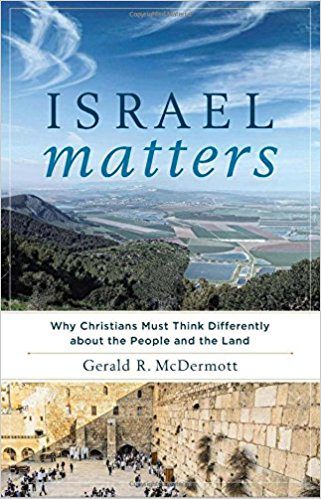 I appreciate Patrick Schreiner’s sensitive and nuanced review of my Israel Matters at the Gospel Coalition on July 14. But while he tries to steer a “third way” between the New Christian Zionism and supersessionism, I fear he runs aground on a new version of supersessionism.
I appreciate Patrick Schreiner’s sensitive and nuanced review of my Israel Matters at the Gospel Coalition on July 14. But while he tries to steer a “third way” between the New Christian Zionism and supersessionism, I fear he runs aground on a new version of supersessionism.
To his credit, Schreiner gets right the basic theses of the book—that the church does not replace Israel and that the people and land of Israel still matter to God. He recognizes that the book rejects all the distinctive features of classic dispensationalism, and that the New Christian Zionism is compatible with covenant theology. I agree with him that Jesus fulfills the Law in a new way.
Yet Schreiner thinks the New Christian Zionism will still be considered dispensationalist. Why? He does not clearly say, but suggests the answer when he asserts that the new covenant was “already inaugurated (both spiritually and materially).” In other words, he seems to think that any eschatology which sees something happening on the ground (materially) before “the final consummation” will be considered dispensationalist.
Strange, because the authors of the New Testament seem to see things happening on the ground before the end of the world–and Schreiner would say the NT is not dispensationalist! Paul says that some day the “fullness of the Gentiles” will come to an end, the “partial hardening that has come upon Israel” will come to an end, and “in this way all Israel will be saved” (Rom 11:25-26). Jesus predicts that one day in the future Jerusalem will welcome him (Lk 13:34-35). Perhaps he meant this would be coincident with “the restoration of the kingdom to Israel” which he implied was still to come, just before he ascended to the Father (Ac 1:6). When the disciples asked him when this would be, he did not dismiss their question as silly or too “material.” He merely said it was not for them to know “the times or seasons that the Father has fixed” (1:7).
Peter was also looking forward to something on the ground before the final consummation. In his second speech in Jerusalem he spoke of the coming “times of restoration of all things which God spoke through the mouth of his holy prophets from ancient time” (Ac 3:21). The word Peter uses for “restoration” is the same word (apokatastasis) used in the Septuagint (the Greek translation of the Old Testament which the early church used as its Bible) for God’s future return of Jews from all over the world to Israel. For Peter, this return and restoration were still to come.
Schreiner’s clear difference with me is on the relation between the church and Israel. He insists that the church is the New or True Israel. He neglects to mention my argument that the word “Israel” is used eighty times in the New Testament, and that in every case it stands for the Jewish people or polity or land of Israel. Schreiner asserts that the church is “called the Israel of God” in Gal. 6:16. But a straightforward reading of that verse’s context suggests that “Israel” there is quite Jewish. Paul contrasts those who do walk by this “rule” of “new creation” (in which “circumcision” at the end of the day is not ultimate) with those who do not walk by this rule. He wishes peace and mercy on those who walk by this rule. Then he adds that he wishes the same peace and mercy for another group that might seem not to walk by this rule: “the Israel of God.” Who are the ones who do not believe that Jesus brings a new creation? Jews who reject Jesus as Messiah. They were the majority of Israel in Paul’s day. Yet he still calls them “of God.” They are still important to God.
That is one reading of this text, without any background knowledge of Paul’s Judaism. But consider this: the blessing at the end (“Peace be upon them and mercy . . . upon . . . Israel”) is probably Paul’s short form (as rabbis often gave short forms of longer biblical texts) of the last benediction of the Amidah, the prayer recited three times a day by Jews then and now: “Grant peace, goodness, and blessing, grace and kindness and compassion, upon us and upon all Israel your people.”
Schreiner concludes his critique with what he thinks is a claim that will undermine my case: that Christ fulfills Israel and Law by corporately embodying both. But I agree with every bit of this statement! And I go further: Christ does not fulfill the Law in the old way but by showing the inner meaning of the Law and Israel. This is what the rabbis said the messiah would do: he would give us the Law of Messiah, or as most English bibles translate it, “the Law of Christ” (1 Cor 9:21).
Hence where we finally disagree is on how Christ fulfills all of the Law during the course of history. In other words, we differ on the eschatological “already but not yet.” Schreiner’s realized eschatology posits that everything has already happened, and there is nothing left on the ground to see except Christ’s appearance at the consummation. I have argued in Israel Matters that the history of redemption is both “already” and “not yet.” Redemption is not only spiritual but also material. This is true for us as individuals but also for the whole world. And not only for our souls but also our bodies. All the saints and all the world will be renewed to become “the new heavens and the new earth.”
The history of the Jews is part of that final renewal. Their land will be at the center. The Lamb will stand “on Mount Zion” in the final stage of history (Rev 14:1), and the new earth will be centered in Jerusalem, which has twelve gates named after “the twelve tribes of the sons of Israel” (Rev 21:2, 12). At some point before that consummation, the nations will “trample” upon “the holy city for forty-two months.” What city is this? It is the one “where their Lord was crucified” (Rev 11:2, 8).
Does Schreiner avoid supersessionism at the end of the day? As long as he insists that the church is the True Israel, and that there is nothing more to expect before the consummation, it seems unlikely. For according to his eschatology, the Jewish people after 33 AD seem no more important than any other: some accept Jesus and some don’t. He understands my position on the land of Israel but seems not to accept it. So for him, it seems, neither the Jewish people nor the land of Israel have theological significance anymore. That is classic supersessionism.











